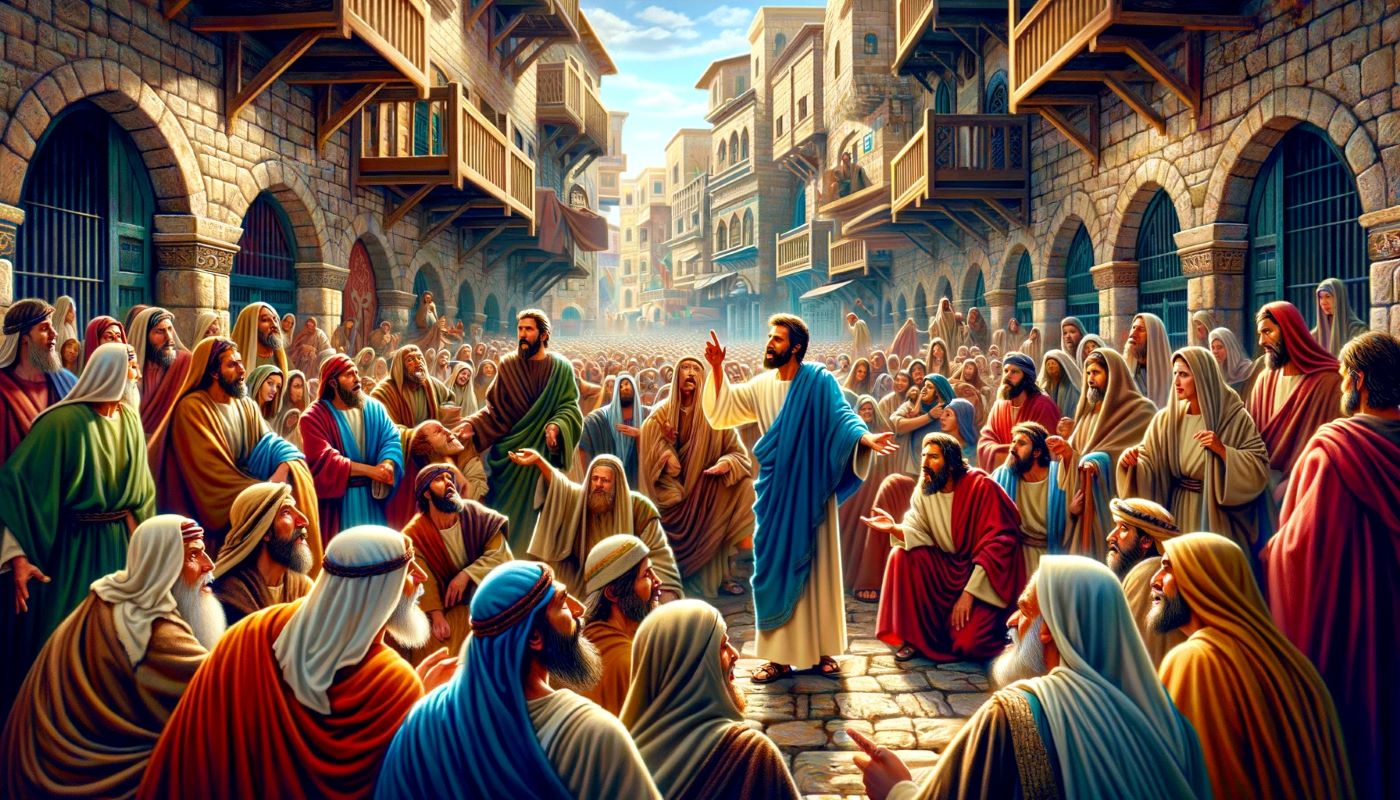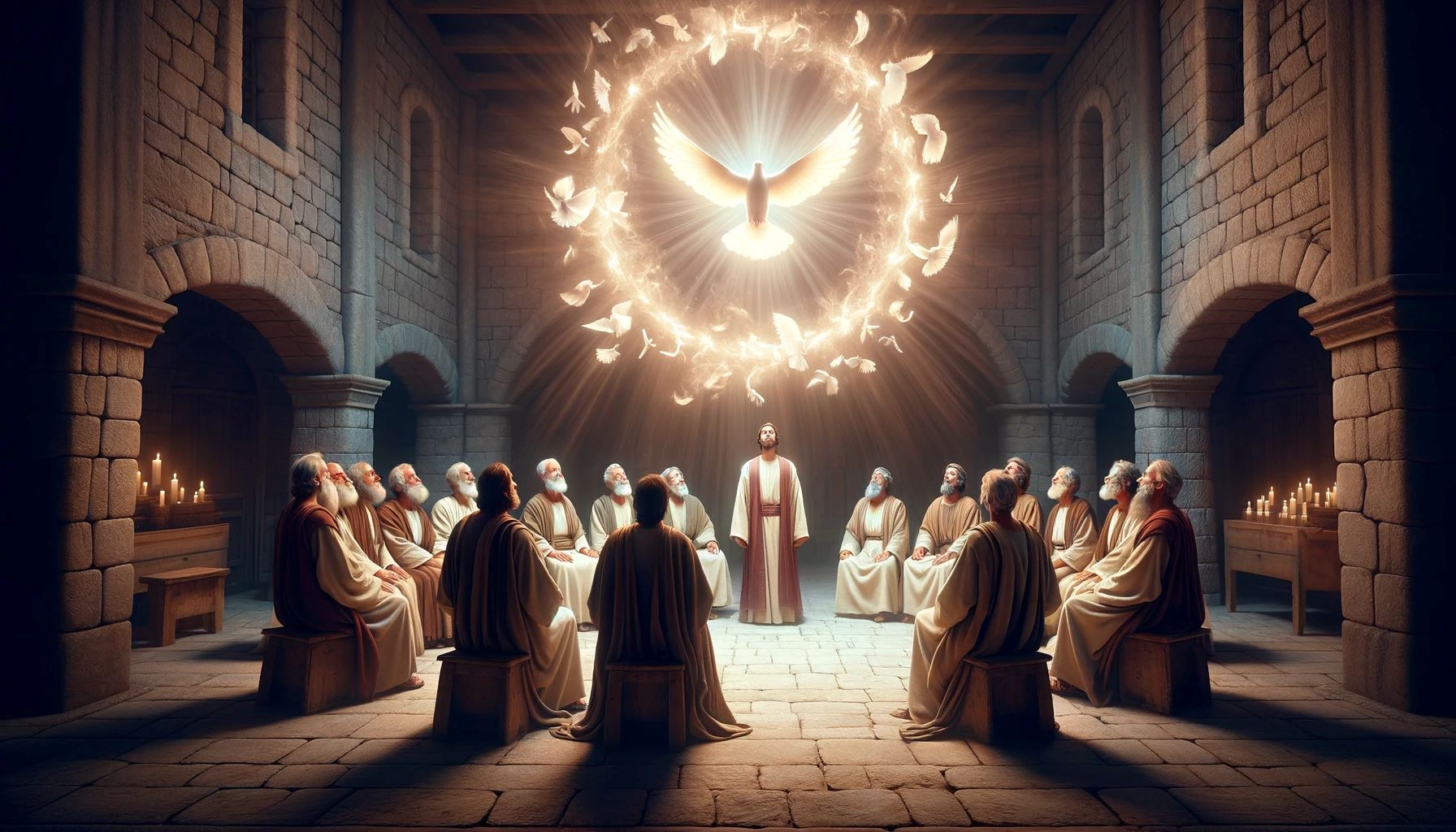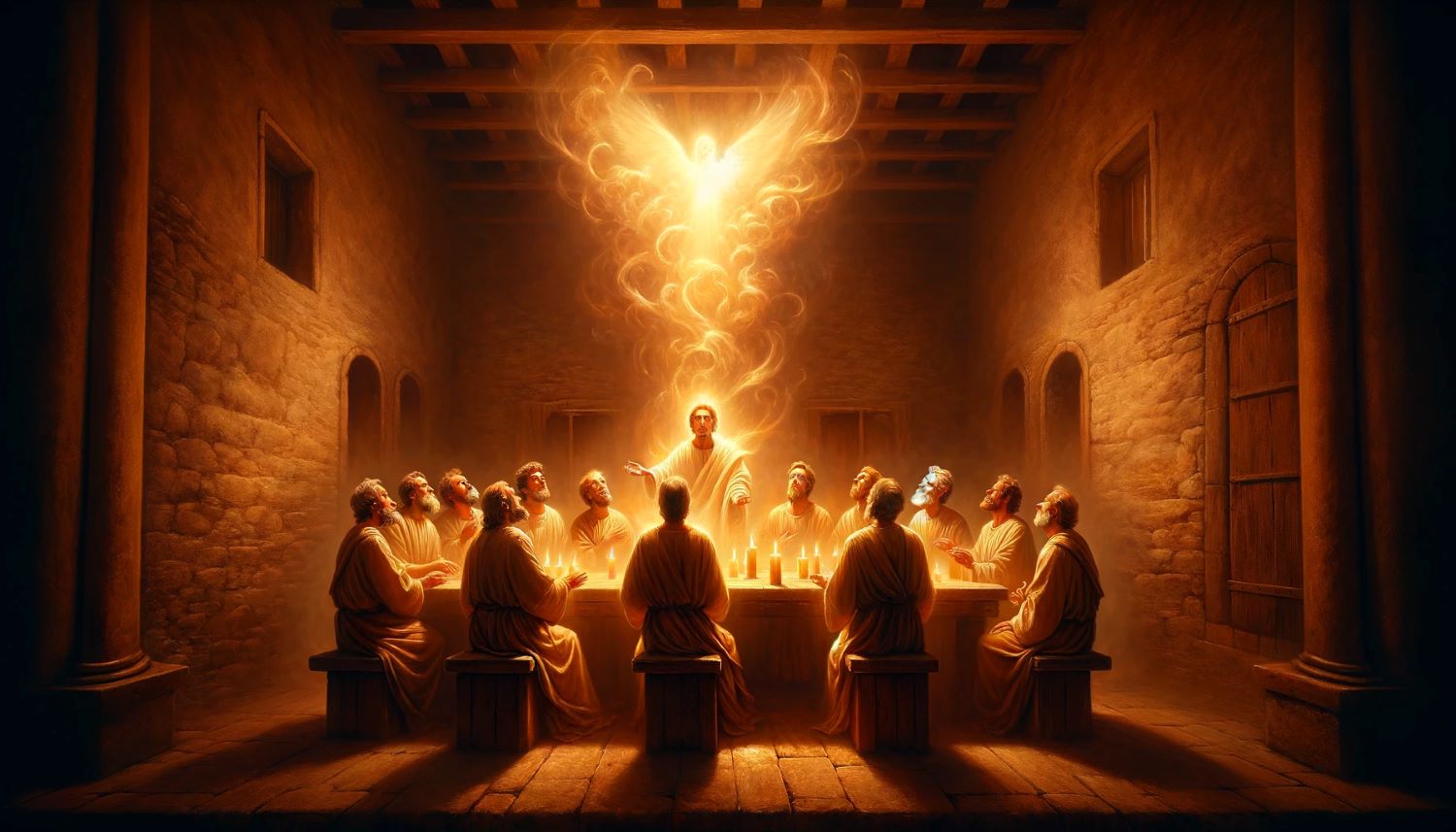Home>Theology and Spirituality>When Did John The Baptist Receive The Holy Spirit


Theology and Spirituality
When Did John The Baptist Receive The Holy Spirit
Published: February 21, 2024
Peter Smith, Editorial Director at Christian.net, combines deep insights into faith, politics, and culture to lead content creation that resonates widely. Awarded for his contributions to religious discourse, he previously headed a major organization for religious communicators, enhancing dialogue on faith's societal impacts.
Discover the significance of John the Baptist receiving the Holy Spirit and its impact on theology and spirituality. Explore the biblical account and its implications.
(Many of the links in this article redirect to a specific reviewed product. Your purchase of these products through affiliate links helps to generate commission for Christian.net, at no extra cost. Learn more)
Table of Contents
Introduction
The story of John the Baptist is a compelling and significant aspect of Christian theology and spirituality. John's life and ministry are intricately intertwined with the arrival of Jesus Christ and the outpouring of the Holy Spirit. Exploring the question of when John the Baptist received the Holy Spirit invites us to delve into the rich tapestry of biblical narratives and theological reflections.
John the Baptist is a central figure in the New Testament, known for his pivotal role as the herald of Jesus Christ. His birth, ministry, and relationship with Jesus are shrouded in profound spiritual significance, offering profound insights into the workings of divine providence and the manifestation of the Holy Spirit in human lives.
As we embark on this exploration, we will journey through the biblical accounts of John's birth, his ministry, and his encounter with Jesus, seeking to unravel the mystery of when, and how, the Holy Spirit may have descended upon him. This inquiry not only sheds light on the spiritual dynamics at play in John's life but also provides a deeper understanding of the interconnectedness of divine interventions in the lives of individuals chosen to fulfill extraordinary purposes.
Join me as we embark on a captivating journey through the life of John the Baptist, a man divinely appointed to prepare the way for the Messiah, and as we seek to uncover the profound spiritual truths embedded within his story. Let's delve into the depths of biblical narratives and theological insights to unravel the enigma of when John the Baptist received the Holy Spirit.
The Birth of John the Baptist
The miraculous birth of John the Baptist is a testament to the divine intervention that permeates the biblical narrative. According to the Gospel of Luke, John's parents, Zechariah and Elizabeth, were righteous and devout individuals, yet they were childless due to Elizabeth's infertility. Despite their old age, an angel of the Lord appeared to Zechariah, announcing that Elizabeth would conceive and bear a son, who was to be named John.
This divine proclamation was met with incredulity by Zechariah, who questioned the angel's message. As a consequence of his disbelief, Zechariah was struck mute until the fulfillment of the angel's words. True to the angel's announcement, Elizabeth conceived and rejoiced in her pregnancy, recognizing it as a divine blessing.
The birth of John the Baptist was marked by extraordinary events. When Elizabeth was six months pregnant, the angel Gabriel visited Mary, the mother of Jesus, to announce the conception of the Savior. Mary, in a spirit of humility and obedience, accepted her role in the divine plan. Subsequently, Mary visited Elizabeth, and upon hearing Mary's greeting, John leaped in Elizabeth's womb, recognizing the presence of the unborn Messiah.
This poignant moment exemplifies the profound spiritual awareness that John the Baptist embodied from the earliest stages of his existence. His recognition of Jesus, even before their births, foreshadowed his future role as the forerunner of Christ. The birth of John the Baptist, therefore, signifies the dawning of a new era, heralding the arrival of the long-awaited Messiah and the fulfillment of divine prophecies.
The circumstances surrounding John's birth are imbued with divine significance, underscoring the intricate orchestration of God's plan for humanity. John's miraculous conception and the divine affirmation of his purpose set the stage for his extraordinary destiny, positioning him as a pivotal figure in the grand narrative of salvation.
The birth of John the Baptist serves as a prelude to the unfolding drama of redemption, signaling the imminent arrival of the Savior and the transformative impact of his ministry. This pivotal moment in salvation history lays the foundation for the profound spiritual journey that John the Baptist would embark upon, ultimately culminating in his encounter with the Holy Spirit and his role in preparing the way for the Messiah.
John's Ministry and Baptism of Jesus
John the Baptist's ministry was characterized by a fervent call to repentance and a profound sense of anticipation for the arrival of the Messiah. His impassioned preaching and baptism of repentance drew crowds from various regions, as people flocked to the wilderness to heed his message and undergo baptism in the Jordan River.
The baptism administered by John symbolized a spiritual cleansing and a symbolic turning away from sin, preparing the hearts of the people for the imminent arrival of the long-awaited Messiah. John's ministry resonated with a sense of urgency, as he fervently proclaimed the need for spiritual transformation and readiness for the coming of the Savior.
Amidst the throngs of people who sought spiritual renewal through John's baptism, Jesus himself came to the Jordan River to be baptized by John. This pivotal moment marked the convergence of their destinies and the commencement of Jesus' public ministry. As Jesus emerged from the waters of baptism, the heavens opened, and the Holy Spirit descended upon him in the form of a dove. A voice from heaven proclaimed, "This is my beloved Son, with whom I am well pleased" (Matthew 3:17).
The baptism of Jesus by John holds profound theological significance, transcending a mere ritual act. It symbolizes the divine affirmation of Jesus' identity as the Son of God and the anointing of the Holy Spirit upon him for the fulfillment of his redemptive mission. This transformative event not only inaugurated Jesus' public ministry but also underscored the intimate connection between John's preparatory ministry and the manifestation of the Messiah.
The encounter between John the Baptist and Jesus at the Jordan River serves as a pivotal moment in the narrative of salvation, signifying the transition from anticipation to fulfillment. It illuminates the profound intertwining of their roles in the divine plan, with John faithfully preparing the hearts of the people while Jesus, the Lamb of God, stepped forward to take on the sins of the world.
The baptism of Jesus by John the Baptist stands as a testament to the divine orchestration of redemptive history, affirming the unity of purpose between the forerunner and the Savior. This momentous event foreshadowed the outpouring of the Holy Spirit upon Jesus and set the stage for the unfolding of his ministry, culminating in the ultimate expression of sacrificial love on the cross.
The baptism at the Jordan River serves as a powerful symbol of spiritual renewal and the inauguration of the new covenant, ushering in an era of grace and redemption for all who would believe. It is within this profound context that we continue to explore the question of when John the Baptist received the Holy Spirit, seeking to unravel the spiritual dynamics that permeated his extraordinary life and ministry.
The Holy Spirit Descends on Jesus
The pivotal moment of Jesus' baptism by John the Baptist in the Jordan River holds profound significance in Christian theology. As Jesus emerged from the waters, the heavens opened, and the Holy Spirit descended upon him in the form of a dove. This divine manifestation of the Holy Spirit marked the initiation of Jesus' public ministry and affirmed his identity as the long-awaited Messiah.
The descent of the Holy Spirit upon Jesus symbolizes the anointing and empowerment for his redemptive mission. In Christian belief, the Holy Spirit represents the third person of the Trinity, embodying the divine presence and power of God. The imagery of the dove, traditionally associated with peace and purity, further accentuates the sacred nature of this divine encounter.
The Gospel accounts of this profound event emphasize the divine affirmation of Jesus' identity as the Son of God. The voice from heaven declared, "This is my beloved Son, with whom I am well pleased" (Matthew 3:17). This proclamation resonates with the Messianic prophecies of the Old Testament, affirming Jesus' role as the chosen one, anointed by the Holy Spirit to bring salvation to humanity.
The descent of the Holy Spirit on Jesus also serves as a paradigmatic example of the divine indwelling and empowerment available to all believers. It signifies the inauguration of a new era, characterized by the outpouring of the Spirit and the establishment of God's kingdom on earth. This transformative event foreshadows the coming of Pentecost, where the Holy Spirit would be poured out upon the early Christian community, empowering them for the proclamation of the gospel.
Furthermore, the imagery of the dove descending upon Jesus evokes the symbolism of creation and new beginnings. In the Genesis account, the Spirit of God hovered over the waters at the dawn of creation, bringing forth life and order. Similarly, the descent of the Holy Spirit upon Jesus inaugurates a new creation, signaling the beginning of God's redemptive work in the world.
The profound significance of the Holy Spirit's descent on Jesus reverberates throughout Christian theology, underscoring the inseparable connection between Jesus' identity, mission, and the empowering presence of the Spirit. This divine encounter serves as a foundational moment in the narrative of salvation, illuminating the profound unity and purpose within the Trinity and the unfolding of God's redemptive plan for humanity.
Did John the Baptist Receive the Holy Spirit?
The question of whether John the Baptist received the Holy Spirit is a topic of profound theological significance and scholarly debate. The biblical accounts provide compelling insights into the spiritual dynamics surrounding John's life and ministry, prompting a closer examination of the timing and manner in which the Holy Spirit may have been manifested in his life.
The Gospel of Luke portrays John the Baptist as a figure uniquely set apart for a divine purpose, even from his mother's womb. The angel Gabriel declared that John would be filled with the Holy Spirit, even from birth (Luke 1:15). This extraordinary pronouncement underscores the exceptional nature of John's calling and the divine empowerment that would accompany his prophetic ministry.
Furthermore, John's role as the forerunner of the Messiah, preparing the way for Jesus Christ, points to a profound spiritual anointing that permeated his life and mission. His impassioned preaching, uncompromising commitment to righteousness, and unwavering dedication to his divine mandate bear the hallmarks of a life guided by the Holy Spirit.
The Gospel of John provides additional insights into the spiritual dimension of John the Baptist's ministry. When questioned about his identity and authority, John declared, "I saw the Spirit descend from heaven like a dove, and it remained on him" (John 1:32). This testimony affirms John's firsthand witness to the divine manifestation of the Holy Spirit upon Jesus at his baptism, underscoring the spiritual awareness and discernment that characterized John's prophetic calling.
While the explicit moment of the Holy Spirit's descent upon John the Baptist is not explicitly recorded in the Gospels, the overarching narrative suggests a profound spiritual presence and guidance throughout his life and ministry. His unwavering commitment to his prophetic mission, his fearless proclamation of repentance, and his recognition of Jesus as the Lamb of God all point to a life deeply attuned to the leading of the Holy Spirit.
In light of these biblical insights, it becomes evident that John the Baptist's life was intricately intertwined with the workings of the Holy Spirit. His prophetic calling, his preparatory role for the coming of the Messiah, and his spiritual discernment all bear the indelible imprint of divine guidance and empowerment. While the specific moment of the Holy Spirit's descent upon John may remain a subject of contemplation, the overarching narrative of his life resounds with the profound influence of the Spirit.
The enigma of when John the Baptist received the Holy Spirit invites contemplation on the mysterious ways in which divine empowerment and guidance unfold in the lives of chosen individuals. It beckons us to ponder the intricate interplay of human agency and divine intervention, and to recognize the profound spiritual legacy of John the Baptist as a herald of the Messiah and a vessel of the Holy Spirit's influence.
Conclusion
In conclusion, the exploration of when John the Baptist received the Holy Spirit unveils profound insights into the spiritual dynamics at play in his extraordinary life and ministry. From the miraculous circumstances of his birth to his prophetic calling as the forerunner of Jesus Christ, John the Baptist emerges as a figure uniquely attuned to the leading and empowerment of the Holy Spirit.
The biblical accounts, particularly in the Gospels of Luke and John, depict John the Baptist as a man divinely appointed and spiritually endowed for his pivotal role in preparing the way for the Messiah. The angelic proclamation of his divine calling, the recognition of Jesus even before their births, and his unwavering commitment to his prophetic mission all bear the unmistakable imprint of the Holy Spirit's guidance and empowerment.
While the explicit moment of the Holy Spirit's descent upon John the Baptist is not explicitly recorded, the overarching narrative of his life resonates with the profound influence of divine presence and guidance. His impassioned preaching, fearless proclamation of repentance, and unwavering dedication to his divine mandate all reflect a life deeply attuned to the leading of the Spirit.
The baptism of Jesus by John the Baptist stands as a pivotal moment, symbolizing the convergence of their destinies and the divine affirmation of Jesus' identity as the Son of God. This transformative event underscores the intimate connection between John's preparatory ministry and the manifestation of the Messiah, highlighting the profound spiritual unity and purpose within the divine plan of redemption.
The enigma of when John the Baptist received the Holy Spirit invites contemplation on the mysterious ways in which divine empowerment and guidance unfold in the lives of chosen individuals. It beckons us to ponder the intricate interplay of human agency and divine intervention, and to recognize the profound spiritual legacy of John the Baptist as a herald of the Messiah and a vessel of the Holy Spirit's influence.
In the tapestry of biblical narratives and theological reflections, the story of John the Baptist stands as a testament to the profound intertwining of human agency and divine providence, culminating in the fulfillment of ancient prophecies and the dawning of a new era of salvation. His life serves as a compelling testament to the transformative power of the Holy Spirit and the enduring legacy of those called to fulfill extraordinary purposes in the divine narrative of redemption.














